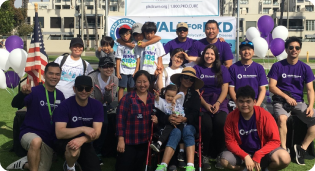Clinical Trial FAQs
Clinical trials are human studies of new treatments or therapies for a disease to ensure that it is both safe and effective. By participating in a clinical trial, you will not only have access to PKD experts, but you might contribute to a medical breakthrough that will impact how PKD is managed for the next generation.

Receive notifications when there are clinical studies in your area.
Why participate in a clinical trial?
Clinical studies are a critical and required step to develop new therapies. However, many clinical trials fail to recruit enough volunteers to populate the study and so cannot complete the research. Under-enrollment is potentially one of the most significant problems facing PKD drug development. With the approval of tolvaptan in 2018, we are excited to have one option for ADPKD patients to potentially slow the progression of their disease. However, new drugs are in the pipeline and, if approved by the FDA, could provide options to ADPKD patients like never before. Should the new therapy being tested in the clinical trial be effective, participants are also one of the first people to benefit before it is released to the public.
What is informed consent?
Informed consent is a process of communication between you and your study doctor about what being in the clinical trial will look like so that you can make an informed decision on participating. The consent form should contain the following information:
- The purpose of the research
- How long it is expected to take
- That participation is voluntary, and you may leave at any time
- A list of procedures you will undergo during your time in the study
- Risk to participating, including potential side effects of the treatment being tested
- Details of how your information will be kept private and confidential
- Contact information for the study team and ethics review board
If you have any questions that are not on the consent form, you do not have to sign it and agree to participate until those questions are answered to your satisfaction by the study team.
And remember: by signing an informed consent form, you are not signing a contract. You can leave the study at any time. In addition, those monitoring the trial for safety (such as your study doctor or study medical monitor) can pull you from a study at any time if they believe your health is declining.
What are eligibility criteria?
Each study’s protocol has guidelines for who can or cannot participate in the study. These guidelines, called eligibility criteria, describe characteristics that must be shared by all participants. The criteria differ from study to study. They may include age, gender, medical history, and current kidney function. Eligibility criteria for treatment studies often require that patients have a particular risk of progression or stage of PKD.
Enrolling participants with similar characteristics ensures that the results will be due to what is under the control of the study, and not other factors. In this way, eligibility criteria help researchers achieve accurate and meaningful results. These criteria also make certain that people who could be made worse by participating in the study are not exposed to the potential risks. The study criteria are approved by ethics review boards and no exceptions can be made.
What are the types of clinical research?
Observational studies do not test new drugs or treatments. In observational studies, doctors and researchers analyze health data to find links between a diagnosis and certain health conditions, disease progression, symptoms or quality of life.
Interventional studies test new ways to prevent, detect, or treat diseases. Treatments may be new drugs, combinations of drugs, surgical procedures, medical devices, or lifestyle interventions like diet and exercise.
What are the “phases” of clinical trials and what do they mean for participants?
The U.S. Food and Drug Administration (FDA) is the federal agency charged with oversight of all the clinical trials going on in the U.S. at any time. A new drug to treat PKD must move through each stage before it can be reviewed for approval by the FDA. The FDA defines the phases for the clinical trials.
- Phase I – The new drug is tested for safety and side effects in a small number of healthy volunteers with PKD.
- Phase II – The new drug is tested for safety, dose ranging, and preliminary effectiveness in a small number of volunteers.
- Phase III – The new drug is tested in a large number of volunteers with PKD to establish effectiveness, monitor side effects, and compare results with current treatments. The data collected during the clinical trial is analyzed and then submitted to the FDA for regulatory review, which can take one to three years. If there is an intent to apply for an NDA (new drug application), it is communicated to the FDA and shapes the design of the study. Once it is approved, the new drug can be prescribed by physicians to treat PKD.
- Phase IV – These studies are done after the drug has been approved by the FDA and it is in use (considered a post-marketing study). Additional information about risks, benefits, and optimal use is collected and analyzed.
What is expected of me once I sign up to be in a clinical trial?
When participating in a clinical trial, one of the biggest commitments is your time. Many trials ask you to come into the clinic for frequent check-ups, blood, and urine tests or other procedures to monitor if the treatment is working and if it’s safe. The best way to get good research results is if all participants complete their scheduled visits and tests. It’s important that you do your best to follow the protocol. If at any time you no longer want to participate, reach out to your study team. They will help you to leave the study safely.
What are the risks?
Every clinical trial is different, and researchers are required to tell you about all possible risks before you agree to participate. Possible risks include:
- Side effects of the medications or treatments being studied
- Unwanted events during the trial that may or may not be related to the study drug
- Failure of the treatment to work
The research team will continuously monitor your health and safety throughout the trial, whether you are receiving the drug being studied or a placebo. A placebo is a sugar pill used to study the difference between those taking and not taking the medication, without either the participant or study team knowing which is which until after the trial.
What happens when the study is over?
After the study is complete for all participants, the data is analyzed and shared with experts and several government agencies (like the FDA) for the drug approval process.
You can request to see your data from the study or to get results from the study as a whole once ready. In some cases, participants can continue to take the medication if it helps and is safe but are not required to continue with other phases of the trials. Each clinical trial is different so be sure to talk to your research team.
How is my privacy protected?
As much as possible, your identifiable information (name, birth date, address, contact information, etc.) is kept private from most members of the research team. No identifiable information is shared outside the research team without your knowing consent. Only authorized staff members of the research team can view the data at any time during, and after, the clinical trial. Privacy policies of the clinical trial are described the informed consent document and are regulated by an ethics review board.
Is there a cost to participate?
There is usually not a cost to participate in a clinical trial. Prior to agreeing to participate, speak to your doctor and research team to make sure the clinical trial is right for you. Participants may also be eligible for travel cost reimbursements through the sponsor of the clinical trial.
Will I really help make a difference?
Yes!
ALL advances in treating diseases have only been made possible because of volunteer participants. To have better treatments in PKD, researchers rely on the participation of patients like you!
PKDF Research Programs
Blog posts
How motherhood inspired PKD patient to get involved with tolvaptan clinical trials
PKD researcher weighs in on how patient participation brought about first treatment
Page last reviewed November 2022




